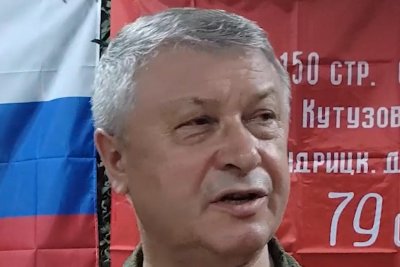Russia says two detained suspects confess to general’s shooting

Russian authorities on Sunday announced the arrest of a suspect in Friday’s failed assassination attempt of Lt. Gen. Vladimir Alexeyev. File Photo by Russian Defense Ministry/EPA
Feb. 9 (UPI) — Two detained Russian nationals have confessed to their roles in the failed assassination attempt of a senior military general, Russia’s Federal Security Service said Monday, as Moscow sought to bolster its claim that Ukraine was behind the attack.
Lt. Gen. Vladimir Alekseyev was seriously wounded Friday when he was shot by an assailant in Moscow. Authorities said Alekseyev was inside a residential building on Moscow’s Volokolamskoye Highway when the attack occurred.
Lyubomyr Korba, born in 1960 in what was then the Ukrainian Soviet Socialist Republic, was arrested over the weekend in Dubai and extradited to Russia. Viktor Vasin, born in 1959, was arrested by Russian authorities in Moscow.
Russia’s intelligence agency FSB said in a statement Monday that both men “confessed their guilt” and described the attempt on Alekseyev’s life.
According to the intelligence agents, Korba was the alleged shooter and Vasin an alleged accomplice.
The FSB accused Korba of entering Alekseyev’s apartment building and waiting for the general to appear in the lobby. Four shots were fired. The pistol, previously identified as a Makarov-type firearm fitted with a suppressor, was discarded at the scene, after which the suspect fled.
Within hours of the shooting, Korba had allegedly boarded a plane for the UAE and was detained in Dubai by local authorities at the request of Russia.
The Investigative Committee of the Russian Federation on Sunday said in a statement that Korba arrived in Moscow late last year “on assignment from the Ukrainian special services to carry out a terrorist attack.”
On Monday, the FSB accused Korba of being recruited by the Security Service of Ukraine in August. He is alleged to have conducted surveillance on senior Russian military officials in Moscow at Kyiv’s instruction.
Russian intelligence said Korba allegedly retrieved the gun and an electronic key for the apartment building from a drop location in Moscow.
Vasin is alleged by Russian agents to be a supporter of the Anti-Corruption Foundation, an organization designated by the Kremlin as a terrorist organization and founded by the late opposition leader Alexei Navalny who died in a Russian penal colony on Feb. 16, 2024.
The FSB accuses Vasin of having rented a “covert residence” for the operation as well as having provided Korba with public transportation tickets.
A third suspect, Zinaida Serebritskaya, born in 1971, is alleged to have lived in the same apartment building as Alekseyev and to have supplied the electronic key used for the alleged shooter to gain access to the target.
The three were identified as suspects in the attempted assassination on Sunday, when the FSB said in a statement that Korba had been handed over to Russia by the UAE.
Neither UAE nor Dubai authorities have confirmed the arrest nor offered details on the operation.
State-run Russian news has published FSB-released video showing the suspect Korba handcuffed and blindfolded being escorted off a plane by masked men and seemingly onto the tarmac of a Russian airport.
Korba has been charged with attempted murder of a service member and illegal possession of firearms, according to the investigative committee.
Russian authorities said Vasin was detained in the Moscow region and is facing the same charges as Korba.
Russia’s Investigative committee said Serebritskaya has left Russia for Ukraine.
Alekseyev, 64, is a senior official in the General Staff and is accused of leading intelligence supporting Russia’s February 2022 invasion of Ukraine.
